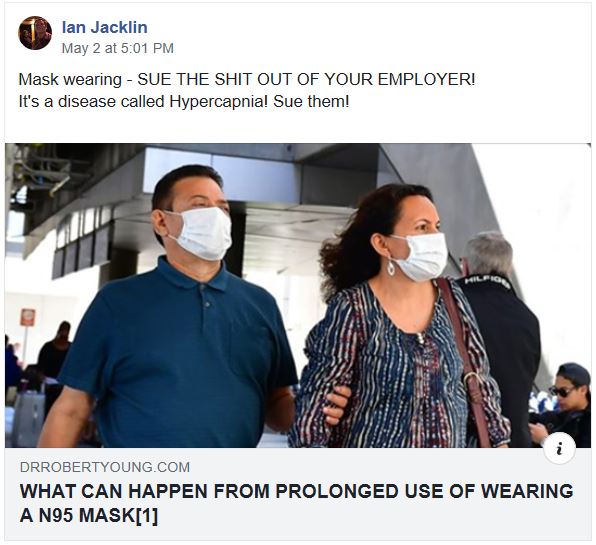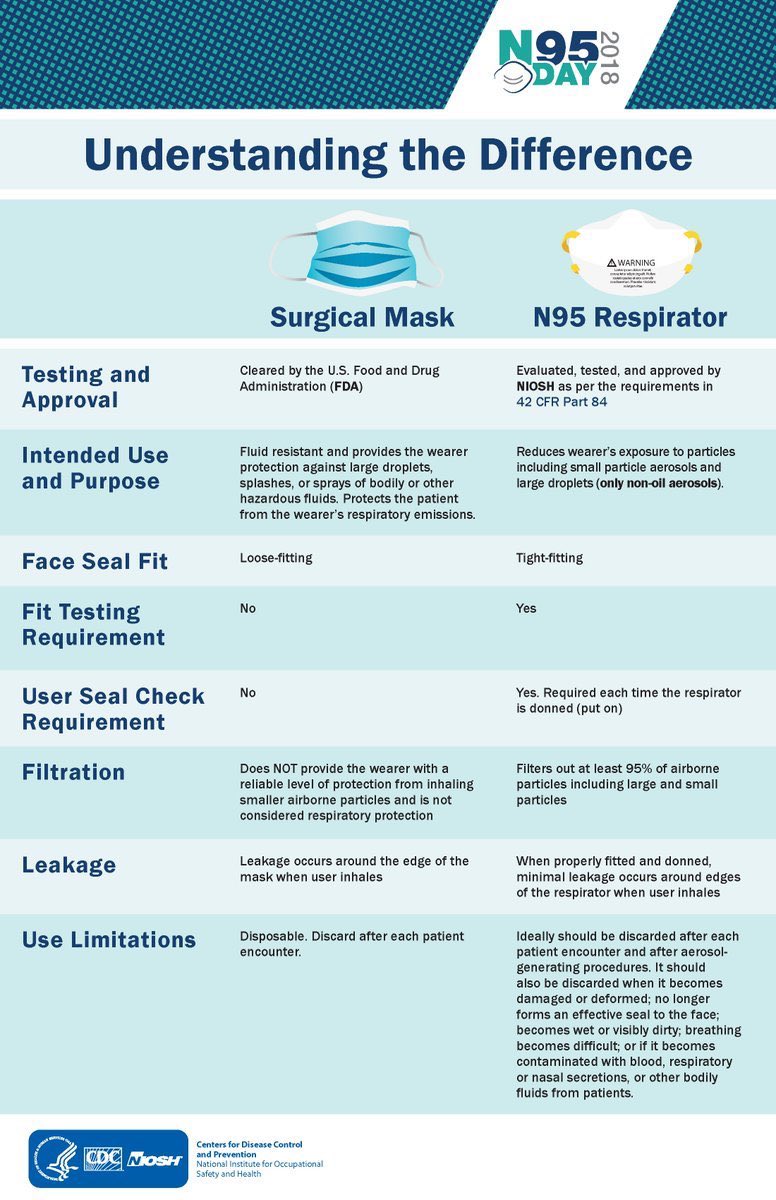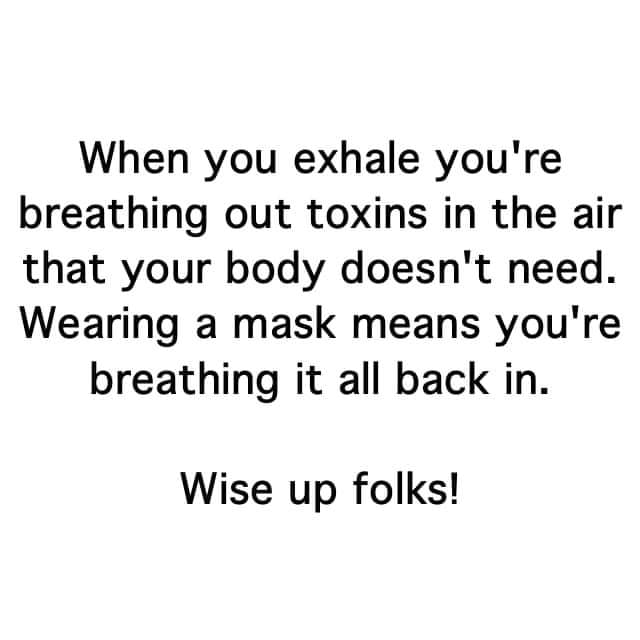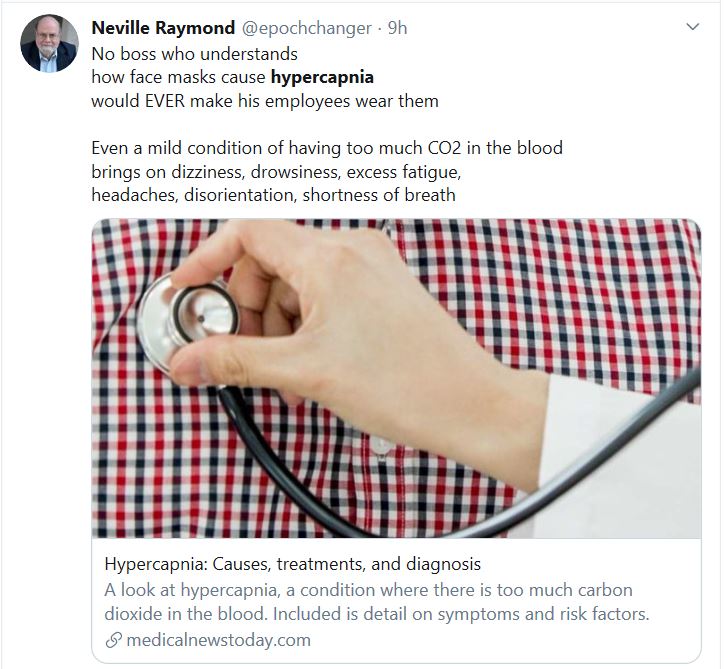Let’s talk about some new #COVID19 dysinfo. In the past few wks, the claim that wearing a mask is medically harmful has been making the rounds.
The argument is that masks cause hypercapnia, which is an abnormally high level of CO2.
SciComm THREAD 1/
The argument is that masks cause hypercapnia, which is an abnormally high level of CO2.
SciComm THREAD 1/
First, let’s quickly visit some other opposition to masks coming from anti-vax/conspiracy circles:
1) Emasculation – aka: real men don’t wear masks, aka: does PPE make you gay?
2) Slavery – aka: face covering is a sign of submission, aka: didn’t slaves cover their faces? 2/
1) Emasculation – aka: real men don’t wear masks, aka: does PPE make you gay?
2) Slavery – aka: face covering is a sign of submission, aka: didn’t slaves cover their faces? 2/
All that is to demonstrate the strong desire to prove masks are harmful in some way. Either politically/culturally as a sign of being sheeple or in a deeper, vaguer sense connected to ideas about masculinity and vulnerability to illness.
3/
3/
So now the groundwork has been laid for pseudoscience to arrive at the party. Ready? Here it comes! 4/
The primary argument is that by covering your mouth you are rebreathing your own exhaled air, which is necessarily higher in CO2 and lower in O2 than room air.
Therefore, masks are not only a symbol of state control, they are a deliberate attempt by the state to cause harm. 5/
Therefore, masks are not only a symbol of state control, they are a deliberate attempt by the state to cause harm. 5/
This idea breaks down pretty quickly when you apply basic common sense. Masks aren’t new, they’ve been around in regular use in health care for over 100 yrs. If hypercapnia were a serious problem with mask wearing, we would know by now. 6/
“Continual” mask wearing is, of course, not defined in any of these dysinfo memes.
Are we talking about a 20 min trip to Costco? Or a 9 hr surgical procedure where surgeon, anesthetist and nurses all wear masks throughout?
Guess what? Neither case leads to hypercapnia. 7/
Are we talking about a 20 min trip to Costco? Or a 9 hr surgical procedure where surgeon, anesthetist and nurses all wear masks throughout?
Guess what? Neither case leads to hypercapnia. 7/
And no surprise, claims of hypercapnia aren’t supported by evidence.
This 2006 study has been cited in support of the dysinfo. It begins with an anecdotal account of a doctor who experienced apparent hypercapnia after 30 min in a PFR95 respirator. 8/ https://onlinelibrary.wiley.com/doi/full/10.1111/j.1365-2044.2006.04767.x">https://onlinelibrary.wiley.com/doi/full/...
This 2006 study has been cited in support of the dysinfo. It begins with an anecdotal account of a doctor who experienced apparent hypercapnia after 30 min in a PFR95 respirator. 8/ https://onlinelibrary.wiley.com/doi/full/10.1111/j.1365-2044.2006.04767.x">https://onlinelibrary.wiley.com/doi/full/...
The researchers found a small increase in exhaled CO2 after 20 min of respirator use, but none of the subjects reported feeling hypercapnic.
This was a tiny study with only 4 subjects that DIDN& #39;T ACTUALLY STUDY the type of mask most people use.
 https://abs.twimg.com/emoji/v2/... draggable="false" alt="👇" title="Down pointing backhand index" aria-label="Emoji: Down pointing backhand index">This is what they studied. 9/
https://abs.twimg.com/emoji/v2/... draggable="false" alt="👇" title="Down pointing backhand index" aria-label="Emoji: Down pointing backhand index">This is what they studied. 9/
This was a tiny study with only 4 subjects that DIDN& #39;T ACTUALLY STUDY the type of mask most people use.
I will leave it to the researchers to sum up what can be taken from this study:
“Clearly, our findings are of uncertain practical significance and further trials would be required employing cognitive and psychomotor measurements and arterial blood gas analysis.”
10/
“Clearly, our findings are of uncertain practical significance and further trials would be required employing cognitive and psychomotor measurements and arterial blood gas analysis.”
10/
“In the event of an influenza pandemic, large numbers of healthcare workers may need to wear these respirators for prolonged periods and problems with hypercapnia might reduce the tolerability of these devices.”
11/
11/
In other words: we don’t know if these results mean anything, but they point to an interesting area of further study concerning RESPIRATOR use by health care workers.
I wish we’d had further research in the 14 yrs between this study and #COVID19. But that didn’t happen.
12/
I wish we’d had further research in the 14 yrs between this study and #COVID19. But that didn’t happen.
12/
But this is NOT A RELEVANT STUDY to the discussion on surgical masks and hypercapnia. Surgical masks are looser fitting than respirators and allow much more air to move back and forth during breathing.
Notice the masks worn in this video? Not N95s, despite the title. 13/
Notice the masks worn in this video? Not N95s, despite the title. 13/
Because surgical masks are looser, they aren’t intended to block airborne particles. They’re mainly for large droplets, like what comes out your mouth or nose when you sneeze. 14/
Here’s the critical point:
If surgical masks aren’t tight enough to block airborne viruses, they are DEFINITELY not tight enough to block CO2.
A molecule of CO2 is WAY SMALLER than a virus. 15/
If surgical masks aren’t tight enough to block airborne viruses, they are DEFINITELY not tight enough to block CO2.
A molecule of CO2 is WAY SMALLER than a virus. 15/
This part is so important.
The hypercapnia dysinfo depends on the idea that CO2 can’t leave your mask and therefore you breathe it in repeatedly. CO2 is roughly 4% of exhaled air, a roughly 100X higher concentration than in room air. 16/
The hypercapnia dysinfo depends on the idea that CO2 can’t leave your mask and therefore you breathe it in repeatedly. CO2 is roughly 4% of exhaled air, a roughly 100X higher concentration than in room air. 16/
This is why sticking your head in a plastic bag is dangerous. CO2 can’t escape, and as you exhale the concentration goes up continuously and you become hypercapnic. You can also become hypoxic (low oxygen) because fresh air outside the plastic bag can’t get in.
17/
17/
THIS IS NOT HOW SURGICAL MASKS WORK. Inside a mask, air moves with each breath, as it’s designed to. Otherwise people would pass out quickly, and as I’ve already said, health workers routinely wear surgical masks for hrs on end - and nobody complains to the hospital employer. 18/
I admit, masks don’t feel good. They essentially need to be uncomfortable and mildly restrictive to work properly (ie, to keep out droplets).
But the discomfort of your breath not moving with absolute freedom and your face getting sweaty under the mask is NOT HYPERCAPNIA.
19/
But the discomfort of your breath not moving with absolute freedom and your face getting sweaty under the mask is NOT HYPERCAPNIA.
19/
Can a mask be harmful for someone with a breathing disorder? Possibly yes, but this is not what the hypercapnia claim is. It’s a highly misinformed and misleading idea not based in science that wearing a mask can cause a healthy person to get sick from high CO2.
20/
20/
This claim is harmful because PPE like masks are crucial for slowing the spread of #COVID19. Masks have been attacked from various angles designed to provoke strong emotions. Fear that masks themselves cause respiratory harm may end up being the most damaging dysinfo of all.
FIN
FIN

 Read on Twitter
Read on Twitter


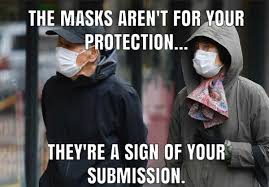

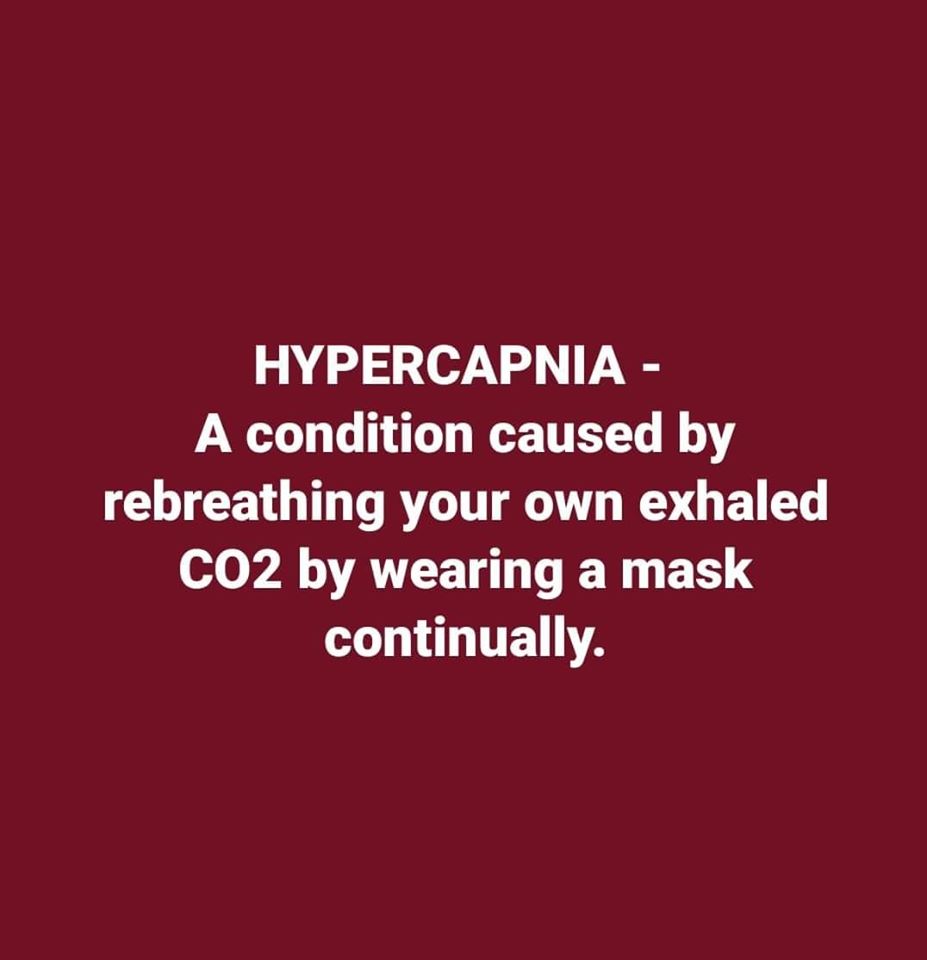

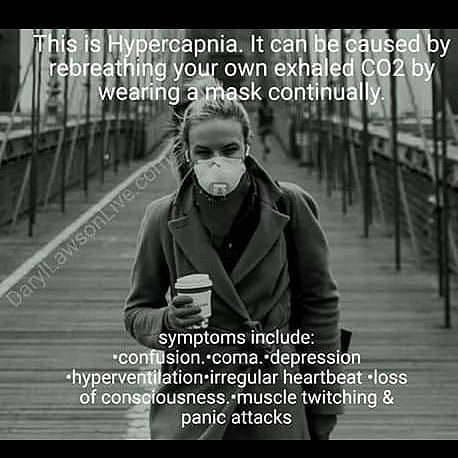
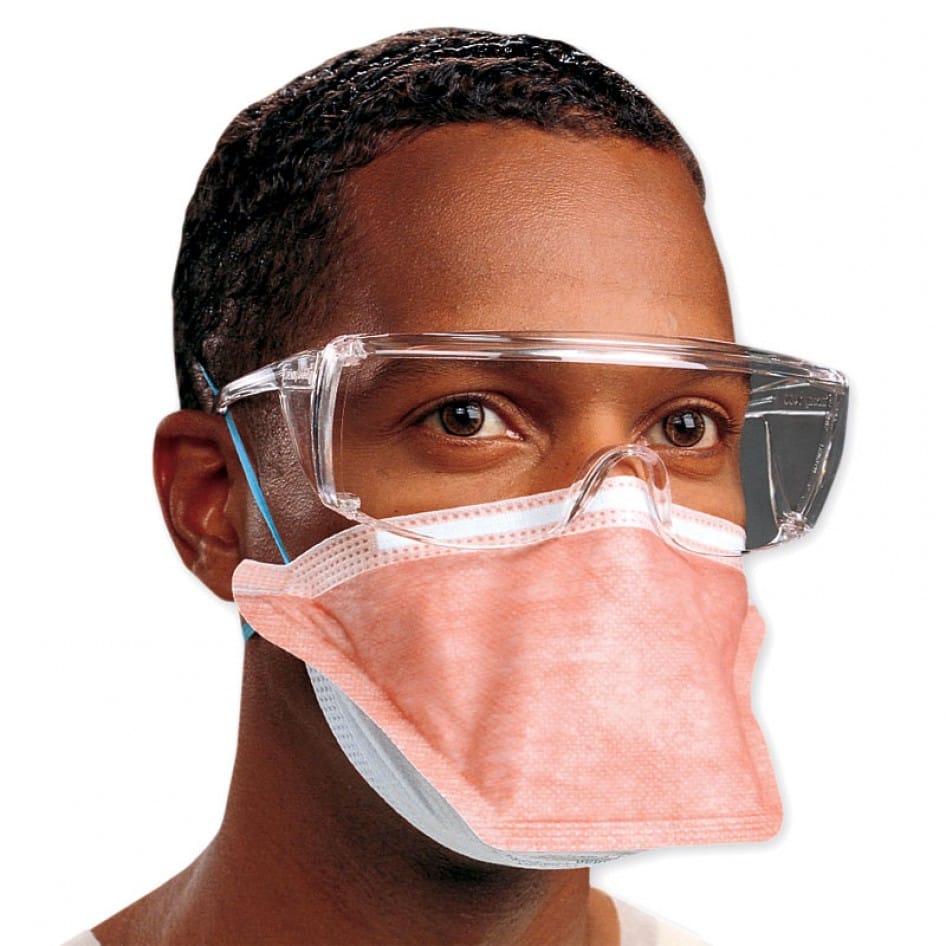 This is what they studied. 9/" title="The researchers found a small increase in exhaled CO2 after 20 min of respirator use, but none of the subjects reported feeling hypercapnic. This was a tiny study with only 4 subjects that DIDN& #39;T ACTUALLY STUDY the type of mask most people use.https://abs.twimg.com/emoji/v2/... draggable="false" alt="👇" title="Down pointing backhand index" aria-label="Emoji: Down pointing backhand index">This is what they studied. 9/" class="img-responsive" style="max-width:100%;"/>
This is what they studied. 9/" title="The researchers found a small increase in exhaled CO2 after 20 min of respirator use, but none of the subjects reported feeling hypercapnic. This was a tiny study with only 4 subjects that DIDN& #39;T ACTUALLY STUDY the type of mask most people use.https://abs.twimg.com/emoji/v2/... draggable="false" alt="👇" title="Down pointing backhand index" aria-label="Emoji: Down pointing backhand index">This is what they studied. 9/" class="img-responsive" style="max-width:100%;"/>
